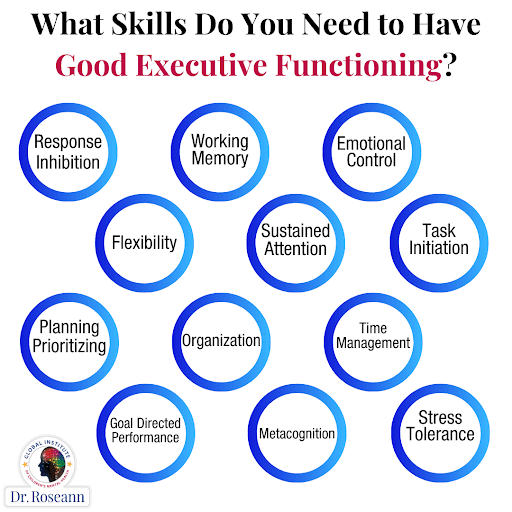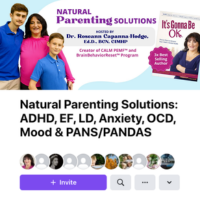So many children with ADHD, autism, learning disabilities such as dyslexia, mental health conditions such as anxiety, OCD or depression, and medical issues such as PANS/PANDAS and Lyme have executive functioning issues. What are executive functioning problems and how do they affect children and teens in everyday life? Executive functioning is a set of mental skills that help you self-regulate, organize and strategically plan for a future action or event.
Kids with executive functioning challenges often get labeled, when instead they are lacking a skill in a specific area related to self-regulation, organization, working memory or strategic planning.
We often label kids with poor executive functioning as:
- Lazy
- Unmotivated
- Disruptive
- Oppositional
- Messy
- Tardy
- Forgetful
Instead, describe kids with poor executive functioning as having challenges in:
- Task Initiation
- Sustained attention
- Emotional Control
- Flexibility
- Organization
- Time Management
- Working Memory
Understanding what executive functions are and how they develop and the neuroscience behind it is important for parents to help their children gain skills that will lead to greater success at school, home and life.
What is Executive Function Development in Children?
These often very bright kids aren't avoiding tasks on purpose, rather they often miss the why and how of tasks. That may be so confusing for most parents who see their kids have great focus and skills during preferred interests and struggle when they are bored. When kids with executive functioning issues are interested and have skills in a task, they can often override their difficulties with concentrated effort.
The day to day is often hard for kids with executive functioning issues because they never connect what they are learning or doing with a future event, goal or end product. They can't “see” how the pieces connect to the big picture.

What are Good Executive Functioning Skills?
When we start thinking about what skills kids and teens need, then it is a lot easier to understand what skills they are missing to be successful. For those that have good executive functioning skills, they are able to start with visualizing the end goal or product and then work backwards strategically planning what they need.
Those with good executive functioning also have good self awareness and environmental awareness, meaning they can connect what they are doing and what actions they need to take with the environment around them. They don't rely on others to cue (or nudge) them, they have that internal awareness and clock to know what steps to take and in what order to get a task done in a timely manner.
Executive Functioning Skills Children and Teens Need To Be Successful at School and Home:
- Response Inhibition – The ability to think before you act.
- Working Memory – Holding information in memory while completing tasks.
- Emotional Control – Managing uncomfortable emotions.
- Flexibility – Ability to revise plans and adapt to change.
- Sustained Attention – Maintaining attention in spite of boredom, distraction or fatigue.
- Task Initiation – Starting projects in a timely manner.
- Planning/Prioritizing – Creating a roadmap to meet goals and one's ability to focus on what's important and what isn't.
- Organization – How one follows, creates and maintains systems.
- Time Management – Estimating time and also staying within limits and deadlines.
- Goal Directed Performance – Following through to completion of goal without distraction.
- Metacognition – Bird's eye view of situation and problem solving.
- Stress Tolerance – How you view, manage and recover from stress
How do Executive Functioning Skills Develop?
Executive functioning skills develop over time with practice at doing skills both independently and with guidance. When children learn to connect with what they are doing right now matters to some future outcome, they can develop good executive functioning skills.
Executive functioning can be broken down into foundational and advanced skills. Logically, advanced skills can't develop without building a solid foundation but often in schools, they are the focus of an IEP and at home, parents understandably try to teach these skills in an effort of a child or teen to independently manage tasks.
What Are Foundational and Advanced Executive Functioning Skills?
Foundational Executive Functioning Skills
- Response Inhibition
- Working Memory
- Emotional Control
- Flexibility
- Sustained Attention
- Task Initiation
Advanced Executive Functioning Skills
- Planning/Prioritization
- Organization
- Time Management
- Goal-Directed Persistence
- Metacognition
- Stress Tolerance
What Parents Can Do to Build Executive Functioning Skills In their Kids
Parents should focus on working on self-regulation and impulse control first because without emotional and behavioral regulation, kids will struggle to learn those higher level skills. When a child struggles with stress tolerance or emotional and behavioral regulation, clinical issues such as anxiety, OCD, ADHD, autism, and depression should always be considered. It is very common for individuals to have a primary mental health issue or neurodevelopmental disorder. Calming the brain is the place to start, as every kid can benefit from a regulated nervous system. Mindfulness activities such as breathing exercises and somatically connecting to the body are easy and effective ways to help your child be more alert and engaged.
Always remember… “Calm Brain, Happy Family™”
Disclaimer: This article is not intended to give health advice and it is recommended to consult with a physician before beginning any new wellness regime.
Are you looking for SOLUTIONS for your child or teen struggling with executive functioning?
Dr. Roseann and her team are all about solutions for kids with EF issues who need blossoming, so you are in the right place!
Register for Dr, Roseann's FREE webinar, 5 Ways to Boost Your Child's Executive Functioning and Attention at School, where Dr. Roseann will show you how to help your child or teen be more alert, listen, develop skills to be independent and self-sufficient and improve task completion.
Need help parenting a child with executive functioning issues, there are 3 ways to work with Dr. Roseann:
- In-person at her Ridgefield, CT center
- Virtually with her at home neurofeedback and coaching programs
- By getting her Get Unstuck Program
You can get her books for parents and professionals, including: It's Gonna Be OK™: Proven Ways to Improve Your Child's Mental Health, Teletherapy Toolkit™ and Brain Under Attack: A Resource For Parents and Caregivers of Children With PANS, PANDAS, and Autoimmune Encephalopathy.
Are you a professional who wants more training from Dr. Roseann?
Purchase her book, Teletherapy Toolkit™: Therapist Handbook for Treating Children and Teens.
If you are a business or organization that needs proactive guidance to support employee mental health or an organization looking for a brand representative, check out Dr. Roseann's professional speaking page to see how we can work together.
Dr. Roseann is a Children's Mental Health Expert and Therapist who has been featured in/on hundreds of media outlets including, CBS, NBC, FOX News, PIX11 NYC, The New York Times, The Washington Post,, Business Insider, USA Today, CNET, Marth Stewart, and PARENTS. FORBES called her, “A thought leader in children's mental health.”
She is the founder and director of The Global Institute of Children's Mental Health and Dr. Roseann Capanna-Hodge. Dr. Roseann is a Board Certified Neurofeedback (BCN) Practitioner, a Board Member of the Northeast Region Biofeedback Society (NRBS), Certified Integrative Medicine Mental Health Provider (CMHIMP) and an Amen Clinic Certified Brain Health Coach. She is also a member of The International Lyme Disease and Associated Disease Society (ILADS), The American Psychological Association (APA), Anxiety and Depression Association of America (ADAA) National Association of School Psychologists (NASP), International OCD Foundation (IOCDF) International Society for Neurofeedback and Research (ISNR) and The Association of Applied Psychophysiology and Biofeedback (AAPB).
© Roseann-Capanna-Hodge, LLC 2021
Always remember… “Calm Brain, Happy Family™”
Are you looking for SOLUTIONS for your struggling child or teen?
Dr. Roseann and her team are all about solutions, so you are in the right place!
There are 3 ways to work with Dr. Roseann:
You can get her books for parents and professionals, including: It’s Gonna Be OK™: Proven Ways to Improve Your Child’s Mental Health, Teletherapy Toolkit™ and Brain Under Attack: A Resource For Parents and Caregivers of Children With PANS, PANDAS, and Autoimmune Encephalopathy.
If you are a business or organization that needs proactive guidance to support employee mental health or an organization looking for a brand representative, check out Dr. Roseann’s media page and professional speaking page to see how we can work together.
Dr. Roseann is a Children’s Mental Health Expert and Therapist who has been featured in/on hundreds of media outlets including, CBS, NBC, FOX News, PIX11 NYC, The New York Times, The Washington Post,, Business Insider, USA Today, CNET, Marth Stewart, and PARENTS. FORBES called her, “A thought leader in children’s mental health.”

She is the founder and director of The Global Institute of Children’s Mental Health and Dr. Roseann Capanna-Hodge. Dr. Roseann is a Board Certified Neurofeedback (BCN) Practitioner, a Board Member of the Northeast Region Biofeedback Society (NRBS), Certified Integrative Medicine Mental Health Provider (CMHIMP) and an Amen Clinic Certified Brain Health Coach. She is also a member of The International Lyme Disease and Associated Disease Society (ILADS), The American Psychological Association (APA), Anxiety and Depression Association of America (ADAA) National Association of School Psychologists (NASP), International OCD Foundation (IOCDF) International Society for Neurofeedback and Research (ISNR) and The Association of Applied Psychophysiology and Biofeedback (AAPB).
© Roseann-Capanna-Hodge, LLC 2023
Disclaimer: This article is not intended to give health advice and it is recommended to consult with a physician before beginning any new wellness regime. *The effectiveness of diagnosis and treatment vary by patient and condition. Dr. Roseann Capanna-Hodge, LLC does not guarantee certain results.













